Related Research Articles
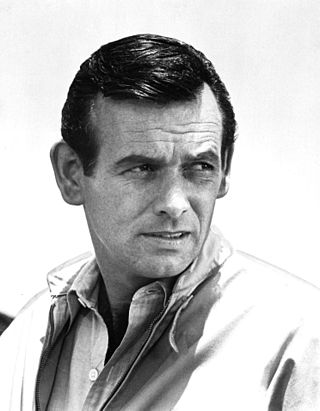
David Janssen was an American film and television actor who is best known for his starring role as Richard Kimble in the television series The Fugitive (1963–1967). Janssen also had the title roles in three other series: Richard Diamond, Private Detective; O'Hara, U.S. Treasury; and Harry O.

Adam-12 is an American police procedural crime drama television series created by Robert A. Cinader and Jack Webb and produced by Mark VII Limited and Universal Television. The series follows Los Angeles Police Department (LAPD) officers Pete Malloy and Jim Reed as they patrol Los Angeles in their police cruiser, assigned the call sign "1-Adam-12". Adam-12 stars Martin Milner and Kent McCord, with several recurring co-stars, the most frequent being William Boyett and Gary Crosby. The series ran over seven seasons from September 21, 1968, until May 20, 1975.

Martin Sam Milner was an American actor and radio host. He is best known for his performances on two television series: Route 66, which aired on CBS from 1960 to 1964, and Adam-12, which aired on NBC from 1968 to 1975.
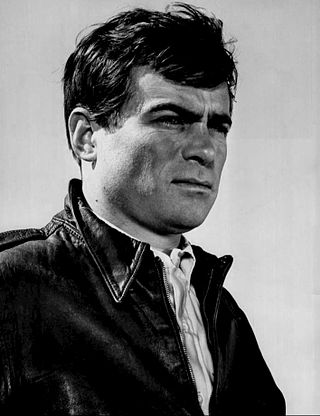
Glenn Corbett was an American actor in movies and television for more than 30 years. He came to national attention in the early 1960s, when he replaced George Maharis in the cast of the popular CBS adventure drama Route 66. He followed this with roles in high-profile films and television shows, including a guest role in the original Star Trek series, the daytime soap opera The Doctors, the primetime soap Dallas, and movies such as Chisum with John Wayne, as one of Jimmy Stewart's sons in Shenandoah, and the World War II epic Midway.

"In Praise of Pip" is an episode of the American television anthology series The Twilight Zone. In this episode, after learning that his soldier son has suffered a mortal wound in an early phase of the Vietnam War, a crooked bookie encounters a childhood version of his son.

Shaft in Africa is a 1973 American blaxploitation film directed by John Guillermin, and the third film of the Shaft series, starring Richard Roundtree as John Shaft. Stirling Silliphant wrote the screenplay. The film's budget was $1.5 million, but the film was a box office flop, grossing just $1 million. Metro-Goldwyn-Mayer quickly sold the property to television, but the television series was cancelled after just seven episodes.

Route 66 is an American adventure crime drama television series that premiered on CBS on October 7, 1960, and ran until March 20, 1964, for a total of 116 episodes. The series was created by Herbert B. Leonard and Stirling Silliphant, who were also responsible for the ABC drama Naked City, from which Route 66 was an indirect spin-off. Both series employed a format with elements of both traditional drama and anthology drama, but the difference was where the shows were set: Naked City was set in New York City, while Route 66 had its setting change from week to week, with each episode being shot on location.
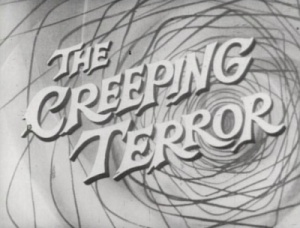
The Creeping Terror is a 1964 horror–science fiction film directed and produced by, and starring, Vic Savage. The plot is centered upon an extraterrestrial, slug-like creature that attacks and eats people whole in a small American town. Widely considered to be one of the worst films of all time, The Creeping Terror has become a cult film.
Stirling Dale Silliphant was an American screenwriter and producer. He is best remembered for his screenplay for In the Heat of the Night, for which he won an Academy Award in 1967, and for creating the television series Naked City, Perry Mason, and Route 66. Other features as screenwriter include the Irwin Allen productions The Towering Inferno and The Poseidon Adventure.

Naked City is an American police procedural television series from Screen Gems that aired on ABC from 1958 to 1963. It was inspired by the 1948 motion picture The Naked City and mimics its dramatic "semi-documentary" format. As in the film, each episode concluded with a narrator intoning the iconic line: "There are eight million stories in the naked city. This has been one of them."
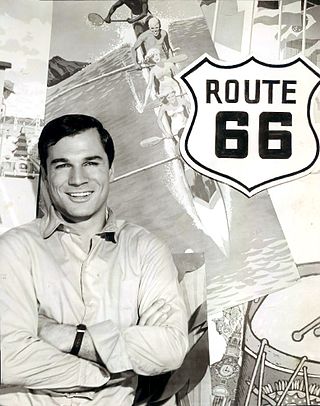
George Maharis was an American actor, singer, and visual artist who portrayed Buz Murdock in the first three seasons of the TV series Route 66. Maharis also recorded several pop music albums at the height of his fame, and later starred in the TV series The Most Deadly Game.

Buz Murdock was a fictional character portrayed by actor George Maharis on the 1960s American prime-time dramatic television series Route 66. Buz was one of three main regular characters on the program, and his tenure lasted for two and a half of the program's four seasons. It ended with Maharis' departure from the show. All told, Buz appeared in 71 of the 116 original episodes.
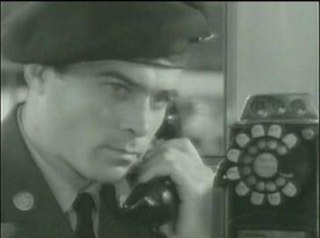
Lincoln Case was a fictional character portrayed by actor Glenn Corbett on the 1960s American prime-time drama Route 66. Linc was one of three main regular characters on the program. His tenure began midway through the show's third season, when he was written in as a replacement for the departed Buz Murdock. Linc appeared in the final 32 of the program's 116 episodes as a sidekick to the character of Tod Stiles.

Mary Janice Rule was an American actress and psychotherapist, earning her PhD while still acting, then acting occasionally while working in her new profession.

Marlowe is a 1969 American neo-noir film starring James Garner as Raymond Chandler's private detective Philip Marlowe. Directed by Paul Bogart, the film was written by Stirling Silliphant based on Chandler's 1949 novel The Little Sister.
The Grass Harp is a 1995 American comedy-drama film based on the novella by Truman Capote. The screenplay, which was the final work of Oscar-winning screenwriter Stirling Silliphant, was adapted for the film. Directed by Charles Matthau, the film features a cast including Piper Laurie, Sissy Spacek, Walter Matthau, Jack Lemmon, Edward Furlong, and Nell Carter. Piper Laurie won the Best Supporting Actress award from the Southeastern Film Critics Association for her performance in the film.

Tiana Alexandra-Silliphant is a Vietnamese-American actress and filmmaker. Her indie movie From Hollywood to Hanoi was the first American documentary feature film shot in Vietnam by a Vietnamese-American. Tiana's life's work, Why Viet Nam? is about her personal story as a child of war and a widow of peace.
Route 66 is an adventure drama sequel series and a remake of the same name that aired on NBC from June 8 until July 6, 1993.
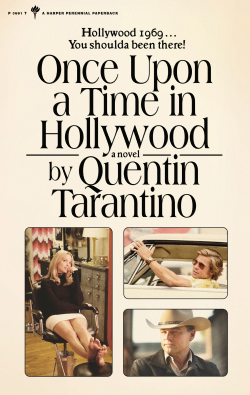
Once Upon a Time in Hollywood: A Novel is the 2021 debut novel by Quentin Tarantino. It is a novelization of his 2019 film of the same name. Like the film, it follows the career arc of fictional action movie star Rick Dalton and his friend and stunt double, Cliff Booth. According to Tarantino, the novel is "a complete rethinking of the entire story" and adds details to various sequences and characters, including multiple chapters dedicated to the backstory of Cliff Booth. It debuted at number one on The New York Times' fiction best-seller list.
References
- ↑ Terrace, Vincent (1993). Television Character and Story Facts. McFarland & Co. p. 402. ISBN 978-0-89950-891-7.
- ↑ Silliphant, Stirling (writer); Ralph Senensky (director) (March 8, 1962), "In the Closing of a Trunk", Route 66, vol. 83, no. 3–21, Lancer-Edling Productions; Screen Gems
{{citation}}: CS1 maint: multiple names: authors list (link) - ↑ Gianakos, Larry James (1992). Television Drama Series Programming. Scarecrow Press. p. 611. ISBN 978-0-8108-2601-4.
- ↑ Silliphant, Stirling (writer); Tom Gries (director) (December 21, 1962), "Give the Old Cat a Tender Mouse", Route 66, vol. 76, no. 3–14, Lancer-Edling Productions; Screen Gems
{{citation}}: CS1 maint: multiple names: authors list (link)